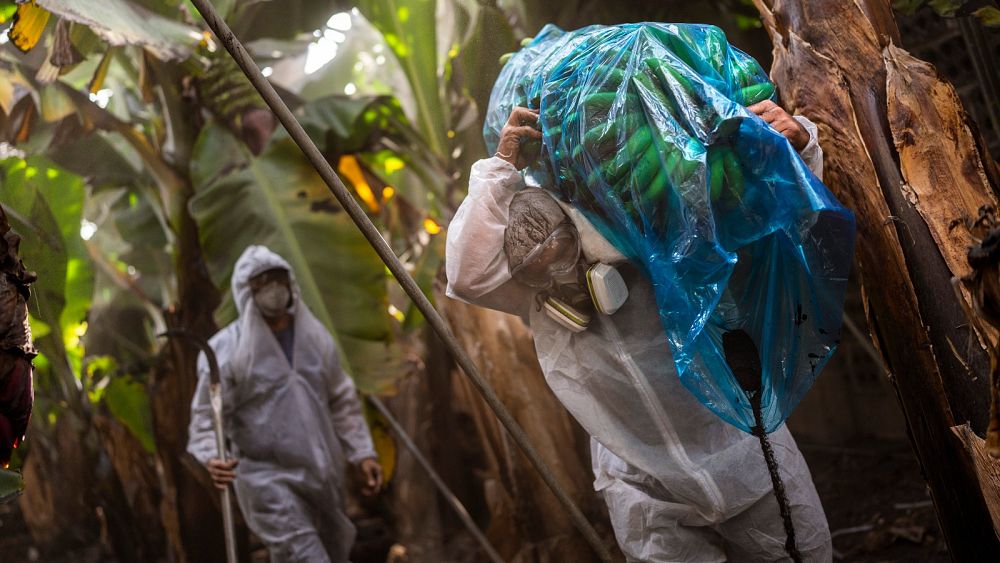
His home went first. Then the house his father built. Then the lottery stand and hardware store he owned succumbed.
Lastly, Antonio Álvarez had to watch as lava from a volcanic eruption slowly devoured the remaining pillar of his family’s wealth: the dozen acres he dedicated to growing the Canary Island banana that for generations has provided the agricultural lifeblood of the Atlantic Ocean archipelago.
“My father always told me ‘don’t make the house too big, it won’t make you money; invest in banana! The bananas will give you a house.’ And it’s true,” Álvarez said. “When I filmed (the lava destroying) my father’s house, it was seeing him die all over again. That house was a part of him.”
Álvarez, 54, is one of thousands of farmers and workers on Spain’s La Palma island whose livelihoods have been put in jeopardy by the destruction wrecked by volcano that is still going strong six weeks after the ground first broke open on Sept. 19.
The regional government of the Canary Islands, an archipelago including La Palma located off the coast of northwest Africa, estimates that the volcano has already caused €100 million in losses for the island’s banana industry. Over 158 hectares of land used for banana farming have been covered by molten rock, and more than 300 hectares have been cut off after roads on the island’s western side were enveloped by lava.
The banana growers association for the Canary Islands, ASPROCAN, estimates that around 1,500 of the island’s 5,000 owners of banana plantations have been hurt. Most owners have small patches of a few acres. Many, like Álvarez, have seen their land burnt and crushed. Others have lost harvests because they can’t get to their trees. And many more have seen their product become unmarketable due to the volcanic ash that has ruined the banana peels.
It’s been an shock wave for an industry that provides 30% of the economic life of the island, according to regional government statistics. There are entire businesses dedicated to packing and transporting the fruit, which, along with tourism, keeps La Palma going.
“They say it has wiped out 10% of the island’s economy. I think it is more. It wasn’t just the bananas, or the apartments, or the bed and breakfasts, it has taken everything,” Álvarez said. “What has happened to us has happened to 90% of the people here.”
La Palma, an island of 85,000, is the second-largest producer of banana for the eight-member archipelago, which at its nearest point is 100 kilometres from Morocco. Last year it produced 148,000 tons of the local banana, most of which were shipped to Spain’s mainland. While usually more expensive than imported bananas from Latin America and Africa, the smaller Canary Island banana is often preferred for its sweeter taste and meatier texture.
Authorities have pledged financial aid to help the sector and fund furloughs for workers. They have also promised to revise a law that says that new land formed by the lava is property of the state.
Desalination plants have been shipped in to supply the water-dependent banana trees at points where lava flows have wrecked the irrigation systems. The island’s government has asked for the military to consider taking farmers in by boat to tend to farms that have been isolated by the rivers of lava.
The lava, however, keeps spewing from the Cumbre Vieja ridge, threatening to widen and consume more land as it churns its way downward to the Atlantic, where a new patch of lava land is forming.
The house of farmer Jesús Pérez is still at risk, but for him the most important property he owns is already gone.
“I would have preferred to lose my house instead of my banana trees,” the 56-year-old Pérez said. “The trees give you life, the house gives you nothing. I have sacrificed all my life, and for what, nothing?”
THE ROTTEN FISH: CAN OF WORMS OPENED OF APC & TINUBU'S GOVERNMENT OVER NIGERIA'S ECONOMIC DOWNTURN
WATCH THE CRITICAL ANALYSIS AND KNOW THE RESPONSIBLE PARTIES TO BLAME FOR NIGERIA'S ECONOMIC CHALLENGES, WHILE CITIZENS ENDURE SEVERE HARDSHIPS.Watch this episode of ISSUES IN THE NEWS on 9News Nigeria featuring Peter Obi's Special Adviser, Dr Katch Ononuju, 9News Nigeria Publisher, Obinna Ejianya and Tinubu Support Group Leader, McHezekiah Eherechi
The economic crisis and hardship in Nigeria are parts of the discussion.
Watch, leave your comments, and share to create more awareness on this issue.
#9NewsNigeria #Nigeria #issuesInTheNews #politics #tinubu THE ROTTEN FISH: CAN OF WORMS OPENED ...
DON'T FORGET TO SUBSCRIBE AND LEAVE YOUR COMMENTS FOR SUBSEQUENT UPDATES
#9newsnigeria #economia #economy #nigeria #government @9newsng
www.9newsng.com
